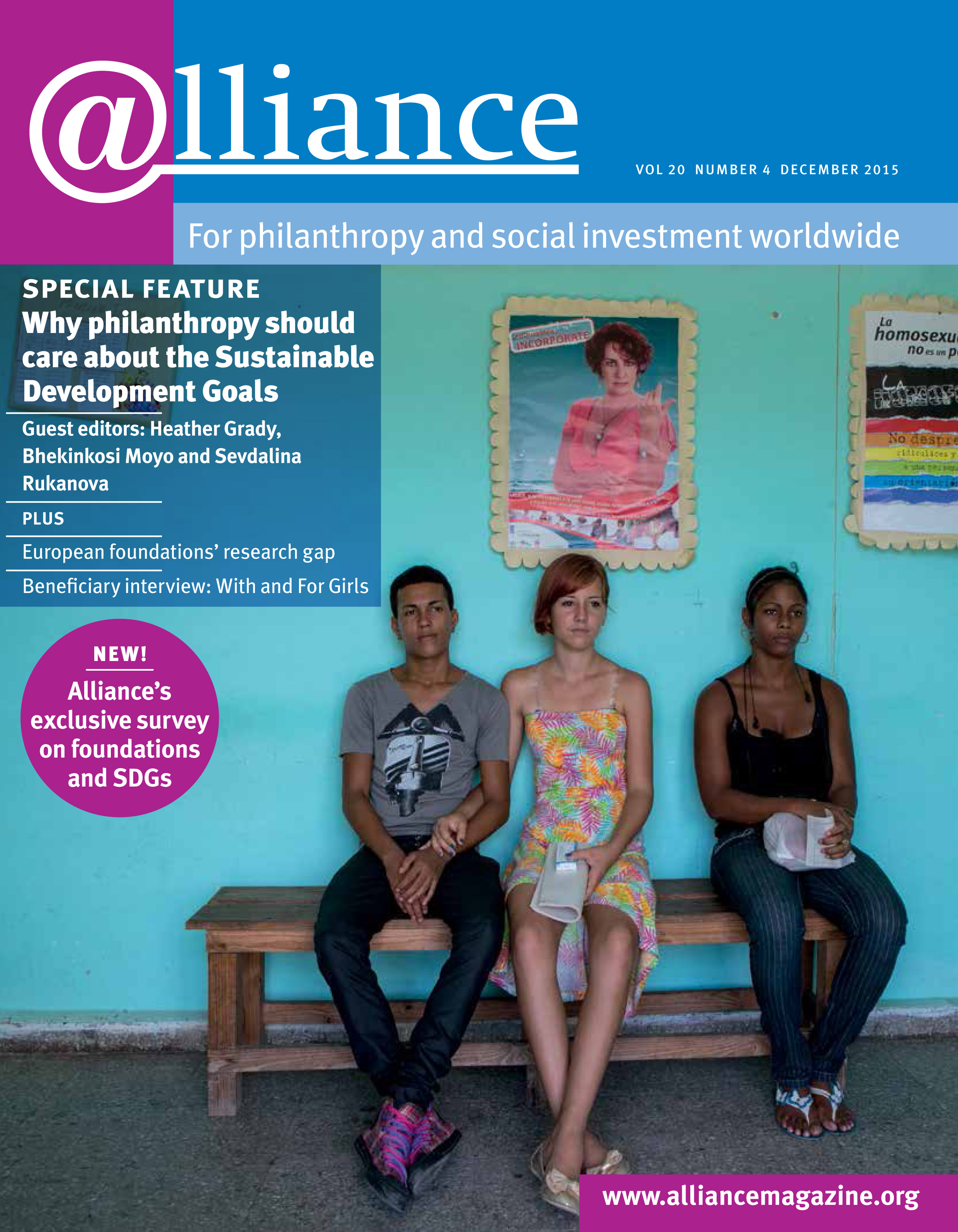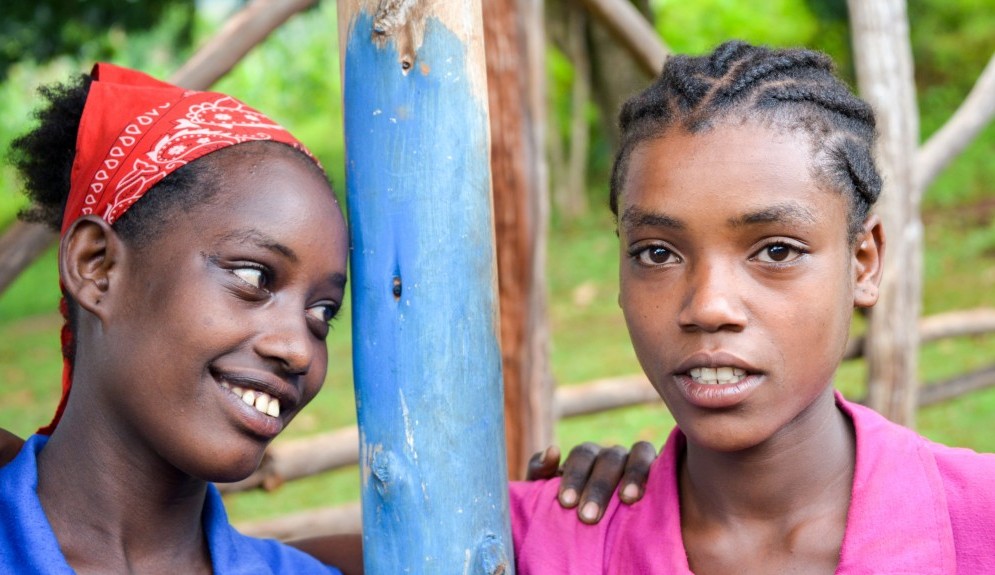There is cause for celebrating commitments made for women and girls by UN heads of state in adopting the 2030 Agenda for Sustainable Development, as well as a sense of relief as it became evident that prolonging the negotiating process would only result in a watered‑down text. But this feeling is bittersweet.
For those of us demanding transformational change, the 2030 agenda is clearly not a paradigm shift. Not only is it silent on the systemic issues that got us to this moment of unprecedented inequality and environmental degradation in the first place, but it also fails to answer how an agenda estimated to cost from $3.5 trillion to $5 trillion every year will be funded.
In its most controversial sections regarding the Means of Implementation (MoI), the adopted text takes the funding issue further by suggesting private corporations take a large share of the responsibility for funding the implementation of the 17 Sustainable Development goals (SDGs), a move that fails to note how corporations are actually part of the problem, not the solution.
Against this backdrop, the philanthropic community has a unique opportunity to rise to the challenge by supporting the work of progressive civil society and women’s rights organizations on the ground pushing for systemic change.
What the 2030 agenda got right
A win for women’s rights and feminist advocates is evident: gender equality and women’s empowerment is not only recognized as ‘a crucial contribution to progress across all the goals and targets’ (paragraph 20) but also as a stand‑alone goal with specific targets (Goal 5).
This was by no means a given in the initial stages of negotiations on the SDGs. Even in this last session, some countries from the African and Arab groups contested references to long-agreed commitments on women’s rights like the Beijing Platform for Action and the International Conference on Population and Development.
‘The gender equality language endured the storm and many recommendations by the WMG were picked up in the final document.’
Nonetheless, the Women’s Major Group (WMG) kept putting pressure through a daily campaign dubbed #WhatWomenWant, detailing key demands that gained the support of many governments’ representatives to rally for the gender equality cause among other structural issues.
The gender equality language endured the storm and many recommendations by the WMG were picked up in the final document. Goal 5 speaks specifically to governments’ commitments to:
- End discrimination and gender-based violence.
- Eliminate child marriage and female genital mutilation.
- Ensure access to sexual and reproductive health care services and education for all.
- Protect women and girls’ reproductive rights.
- Eliminate gender disparities in schools and ensure equal access to education.
- Provide education that promotes gender equality and human rights.
- Expand women’s economic opportunities and recognize their rights to resources.
- Reduce the burdens of unpaid care work on women and girls.
Important recognitions can also be found on decent work and social protection and a new multi‑stakeholder Technology Facilitation Mechanism (TFM) to provide technological development in support of achieving the SDGs. The latter was the only concrete new agreement coming out of the Third Financing for Development Conference (FFD3) held in Addis Ababa in July 2015 and a long‑standing demand from developing countries.
All of this represents a big leap in relation to the minimal commitments, in particular those on gender, of the predecessor Millennium Development Goals (MDGs) and gives us powerful tools to work for implementation.
The obstacles that remain
All of the positive commitments, including Goal 5 on gender equality and women’s empowerment, risk remaining mere ink on paper if the funding is not concretely resolved and systemic issues remain untouched.
Negotiations on the MoI section of the agenda proved to be the real headache. The prospects did not look too good after FFD3 failed its mandate to scale up public financing to fund the SDGs, and failed to insist on necessary changes in global governance, macroeconomic, financial, trade, tax, debt and monetary policies to favour people and planet.
The 2030 Agenda did not advance one bit from the weak outcome of FFD3, known as the Addis Ababa Action Agenda (AAAA). Instead, a pick and choose exercise from the AAAA to the 2030 agenda ended up reaffirming a neoliberal economic framework and enabling further corporate control of UN development agendas.
A paragraph on trade liberalization in the 2030 agenda, for instance, calls on governments to ‘redouble their efforts to promptly conclude the negotiations on the Doha Development Agenda’ as well as promote ‘meaningful trade liberalization’. In light of the gigantic trade agreements being hatched at the moment across the world’s largest economies, granting stronger corporate control to the world’s resources and trade flows, this presents enormous risks for the realization of human rights, ecological, social and gender justice.
Governments failed to meaningfully change the rules of the game, rejecting proposals for stronger global financial regulation and wealth redistribution that would tap the wealth of the rich 1 per cent and curb the impact of illicit financial flows in developing countries. A fundamental question then begs a response: where will the needed funding for implementation of the SDGs and the advancement of women’s rights for the next 15 years come from?
Supporting women’s rights organizing beyond the rhetoric
Efforts towards ensuring Goal 5 on gender equality and women’s empowerment is given adequate funding are under way; no doubt a good sign. But resources cannot come from private sector money alone, least of all if these do not go hand in hand with clear transparency and accountability.
There is no doubt the private sector is becoming a central player in funding development agendas. The UN itself has been expanding its partnerships with several transnational corporations including Nike, Coca‑Cola or Unilever – not without criticism.
AWID also notes a trend in the increasing interest from new private sector actors – such as the World Bank or Walmart – towards ‘investing in women and girls’, to use their own words. Despite the rhetorical language that encompasses the IMF slogan ‘empowering women is smart economics’, this trend has not necessarily translated into real resources for women’s rights organizing, the very movements that are able to make change happen beyond quick fixes.
In fact, AWID’s recent research into 170 different partnership initiatives focused on women and girls, found that 143 of them collectively committed $14.6 billion. Out of these 170, 27 per cent supporting women and girls said they engaged women’s organizations as ‘partners’, but only 9 per cent directly funded them.
States also bear the primary responsibility as duty bearers for the fulfilment of the full range of women’s rights and the achievement of the SDGs they themselves committed to. An analysis conducted by AWID in 2013 on the grants from the Dutch Ministry of Foreign Affairs’ MDG3 Fund demonstrates the huge reach and transformation that is possible when organizations working to build women’s collective power for change receive serious resources for an extended period of time.
‘Facing a context of fewer resources, women’s rights organizations and human rights defenders face increasing violence, inequalities and environmental uncertainty, coupled with tremendous risks at the personal level for the work they do.’
Facing a context of fewer resources, women’s rights organizations and human rights defenders face increasing violence, inequalities and environmental uncertainty, coupled with tremendous risks at the personal level for the work they do. A bold support for women’s rights organizing that can translate commitments in New York into action on the ground is needed to stop the cycle of impoverishment and transform all forms of oppression.
Donors and the philanthropy community in all its diversity must play a vital role in revitalizing progressive movements for change so that we don’t forget why we came to the SDG conversation in the first place: to transform a deeply unjust global governance system that puts wealth and power in the hands of a tiny few to the detriment of people and planet.
Well-funded feminist mobilization is essential to resist the systemic obstacles ahead including on trade, global finance, corporate capture, and redistribution so that the 2030 agenda can advance gender justice and human rights for all.
Ana Abelenda is economic justice coordinator for the Association for Women’s Rights in Development (AWID). Email aabelenda@awid.org
For more discussion on the SDG debate, listen to our Alliance Audio podcast.







Comments (0)